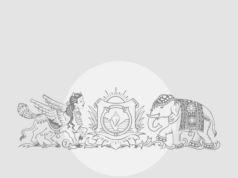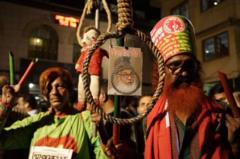
image source, EPA
Anti-Jamaat Bangladeshis protesting with posters of Jamaat leader Nizami in May 2016
The Supreme Court of Bangladesh has refused to allow the country’s largest Islamic party to participate in the general elections.
Bangladesh Jamaat-e-Islami had filed a petition in the Supreme Court and appealed to lift the ban imposed in 2013.
At that time, citing the constitutional provision of secularism, the Supreme Court had banned Jamaat from contesting elections and canceled its registration with the Election Commission.
At that time the court had not banned it from participating in politics, but it cannot contest elections as a party on any election symbol.
This decision of the court came at a time when there were demands for a complete ban on Jamaat, because it was against Bangladesh’s freedom struggle against Pakistan in 1971.
Jamaat has close relations with Bangladesh’s main opposition party, Bangladesh Nationalist Party (BNP). When Khaleda Zia of BNP was the Prime Minister between 2001 and 2006, Jamaat was also a partner in power.
Elections are going to be held in Bangladesh on January 7 and many opposition parties including BNP are threatening to boycott it.
He says that fair elections cannot be held under the ruling Awami League and Prime Minister Sheikh Hasina.
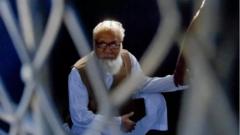
image source, AFP
Jamaat leader Motiur Rahman Nizami was against separate Bangladesh. He was hanged in 2016 at the age of 73. Many leaders of Jamaat including Nizami have been given death sentence and life imprisonment in Bangladesh.
Controversial history of Jamaat
A five-member bench of the Supreme Court led by Chief Justice of Bangladesh Obaidul Hasan was hearing the petition of Jamaat-e-Islami.
The chief counsel of the Jamaat remained absent citing personal problems and had appealed to postpone the hearing for six weeks. But the court rejected both his request and the appeal filed by the party.
Despite Sunday’s decision, it is not yet clear whether Jamaat can continue its political activities or not.
Generally, the job of banning any organization for ‘anti-national’ activities rests with the Home Ministry.
After the Awami League came to power in 2009, Prime Minister Sheikh Hasina prosecuted top Jamaat leaders, a key ally of her rival Khaleda Zia’s party BNP, for genocide and war crimes.
Since 2013 till now, many leaders of Jamaat have been sentenced to death and life imprisonment. It is the fourth largest party in Bangladesh, but is not registered.
For 15 years, Jamaat has been continuously facing pressure from the Awami League government of Bangladesh.
Despite losing many of its leaders, it enjoys the support of the people on a large scale. This can also be ascertained from the crowd gathering in the rallies of Jamaat.
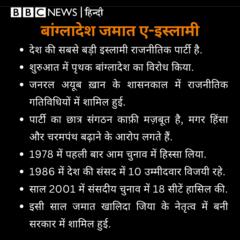
Doubts about elections
In the elections to be held in Bangladesh on January 7, Awami League would like to return to power for the fourth consecutive time, while Khaleda Zia’s party has threatened to boycott the elections.
Jamaat-e-Islami had also said that it would boycott the elections while Hasina is in power.
However, after the decision of the Supreme Court, his chances of contesting the elections directly have ended.
Jamaat is also opposed in Bangladesh because initially it was not in favor of separating from Pakistan and creating Bangladesh.
This is a sensitive topic in Bangladesh because Pakistani soldiers are accused of mass killing people in connivance with some people present in East Pakistan (present-day Bangladesh) at that time.
During the conflict that lasted for almost nine months, a large number of people also took refuge in the neighboring country India.
At that time India had helped the exiled government of East Pakistan and the founder of Bangladesh Sheikh Mujibur Rahman. Mujib-ur-Rehman was the father of current Prime Minister Sheikh Hasina.
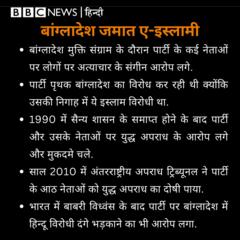
Threat of boycotting elections
The ruling Awami League has started preparations for the 12th parliamentary elections, but political analysts believe that it will have to face many challenges.
BNP and parties with similar ideology do not want elections to be held during the tenure of the present government. They allege that the Election Commission is being biased.
Recently, the US administration had sent a letter to Awami League and BNP asking them to create an environment for elections through communication.
BNP said that it is the responsibility of the government, while Awami League said that there is no time for dialogue.
Meanwhile, more pressure is on the ruling party. America has also warned that if the rights of workers in Bangladesh are compromised then restrictions on trade can be imposed.
Zubaida Nasreen, a political analyst and teacher at Dhaka University, told BBC Bangla that the Awami League government has the responsibility to create a trustworthy and violence-free environment for elections, so that anyone can vote without fear.
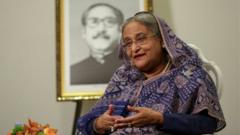
image source, REUTERS
There is huge international pressure on Prime Minister Sheikh Hasina to conduct fair elections.
The 2014 general elections in Bangladesh were held amid heavy violence and were boycotted by parties like BNP.
Even though opposition parties also participated in the 2018 elections, they later alleged rigging.
Political analyst, Professor Nazmul Ahsan Kalimullah tells BBC Bangla, “The world’s hopes of conducting elections in Bangladesh with everyone’s participation and participation seem to be faltering. The challenge before the Awami League is how it ensures the participation of all parties in the elections.”
At the same time, Awami League leader Abdur Rehman says that most of the parties will participate in the elections. He said, “What can one do if one does not want to participate in the elections due to fear of defeat? Most of the parties will participate and every seat will be contested.”
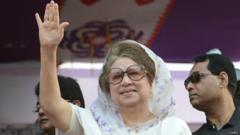
image source, GETTY IMAGES
Khaleda Zia
Pressure on Awami League
Awami League has started the process of selecting candidates. Awami League is currently in power with a coalition of 14 parties.
Political analysts believe that if BNP boycotts the elections, Awami League will come to power. In such a situation, all these constituent parties would like to remain with Awami League.
This time, Bangladesh Jatiya Party, which was part of the alliance with Awami League, was in opposition in the last elections. This time too he has started preparations to contest elections separately.
However, there are differences in this party also. Prominent party leader Roshan Ershad wants the elections to be fought with the Awami League, while Chairman GM Qadir says that the elections should be contested alone.
Political analyst Zubaida Nasreen says, “If the opposition party BNP does not participate in the elections, then it remains to be seen how the pressure from the international community will be dealt with and the court does not recognize the elections.”
However, Awami League leader Abdur Rehman says that the international community has talked about free and fair elections and the Awami League also wants the same.
He said, “Nothing is challenging. We feel that everyone should participate in conducting fair elections.”


